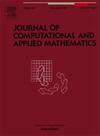Existence theorems of generalized K-lateral support equilibria via local cooperative strategies for multi-player pure strategy games in tensor form
IF 2.1
2区 数学
Q1 MATHEMATICS, APPLIED
Journal of Computational and Applied Mathematics
Pub Date : 2025-03-16
DOI:10.1016/j.cam.2025.116634
引用次数: 0
Abstract
In this paper, we introduce a novel equilibrium framework in pure strategy games called -lateral support equilibrium (-LSE), encompassing unilateral support equilibrium and Berge equilibrium as special cases. This framework applies to a broad class of -person pure strategy games, with the values of varying from 1 to . Two fundamental theorems provide necessary and sufficient conditions for the existence of strategy profiles corresponding to pure -LSEs. When the strategy set of each player has finite elements, we develop a tensor representation of -LSEs and design an algorithm for computing -LSEs in -player pure strategy games. This algorithm provides a useful method with tensor representation for addressing equilibrium problems in complex high-dimensional game scenarios. The effectiveness of this algorithm is demonstrated through numerical examples involving a four-player game, where the algorithm successfully identifies all unilateral, bilateral and Berge equilibria. Additionally, the relationships of different -LSEs are also established and discussed.
张量形式的多人纯策略对策的局部合作策略广义k -侧向支持均衡的存在性定理
本文在纯策略博弈中引入了一个新的均衡框架,即k -侧向支持均衡(K-LSE),并将单边支持均衡和Berge均衡作为特例。这个框架适用于宽泛的n人纯策略博弈,其K值从1到n- 1不等。两个基本定理为对应于纯k - lse的策略轮廓的存在性提供了充分必要条件。当每个参与者的策略集都有有限元素时,我们建立了k - lse的张量表示,并设计了n人纯策略博弈中k - lse的计算算法。该算法为解决复杂高维博弈场景中的平衡问题提供了一种有用的张量表示方法。通过涉及四人博弈的数值示例证明了该算法的有效性,其中该算法成功地识别了所有单边,双边和Berge均衡。此外,本文还建立并讨论了不同k - lse之间的关系。
本文章由计算机程序翻译,如有差异,请以英文原文为准。
求助全文
约1分钟内获得全文
求助全文
来源期刊
CiteScore
5.40
自引率
4.20%
发文量
437
审稿时长
3.0 months
期刊介绍:
The Journal of Computational and Applied Mathematics publishes original papers of high scientific value in all areas of computational and applied mathematics. The main interest of the Journal is in papers that describe and analyze new computational techniques for solving scientific or engineering problems. Also the improved analysis, including the effectiveness and applicability, of existing methods and algorithms is of importance. The computational efficiency (e.g. the convergence, stability, accuracy, ...) should be proved and illustrated by nontrivial numerical examples. Papers describing only variants of existing methods, without adding significant new computational properties are not of interest.
The audience consists of: applied mathematicians, numerical analysts, computational scientists and engineers.

 求助内容:
求助内容: 应助结果提醒方式:
应助结果提醒方式:


